“All Who Will Yield to Evidence:” An Historical View of Vaccine Opinions
The search for inoculation from the most dreadful diseases that afflict humankind has been relentless for centuries. The history of the American colonies was affected by the decision of George Washington to mandate a smallpox vaccination for the American army in 1777. He wrote to Dr. William Shippen, Jr. ordering him to inoculate all American troops who came through Philadelphia. In his letter, referring to smallpox, the general wrote “we should have more dread of it, than from the Sword of the Enemy.” Because of the European practice of infecting people with milder forms of the disease, British troops were not so susceptible to what was then called variola, while the American troops were not protected. Washington’s decision was a gamble, but it worked. It may have won the revolution.
In 1796 Edward Jenner, a British physician, developed a new vaccine made from the pus drawn from an infected person. His approach was revolutionary.
Benjamin Waterhouse was the first American physician to test a smallpox vaccination. On December 25, 1800, President Jefferson wrote to Waterhouse thanking him for sending him his “pamphlet on the subject of the Kine-pock”.
I had before attended to your publication on the subject in the news papers [sic], and took much interest in the result of the experiments you were making. Every friend of humanity must look with pleasure on this discovery, by which one evil more is withdrawn from the condition of man; must contemplate the possibility, that future improvements and discoveries may still more and more lessen the catalogue of evil.
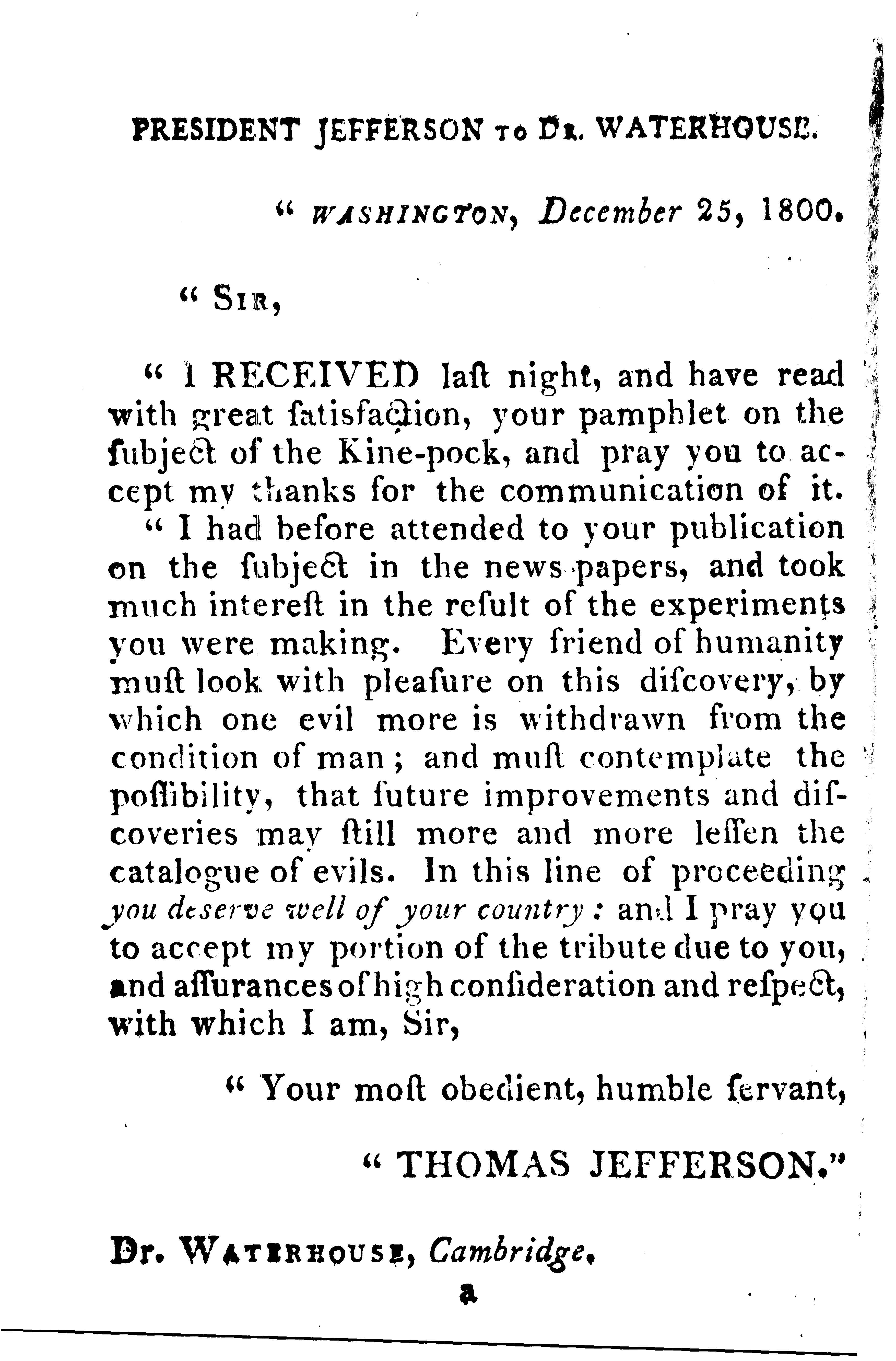
Perhaps not surprisingly, as soon as Jenner’s success was published and implemented there were those who objected to the concept. The protest was strong enough to cause Dr. Jenner to publish a response in 1801.
It will perhaps be thought unnecessary at this period when the world is already furnished with such abundant evidence of the safety of the Vaccine Inoculation, and its efficacy in protecting the human constitution against the small-pox, to advance any thing farther on the subject; but lately having seen in the public papers some letters tending to excite alarm among those, who have adopted the new system of inoculation, I could not refrain from offering a few words with a hope that they may allay any unpleasant sensations arising from this source.
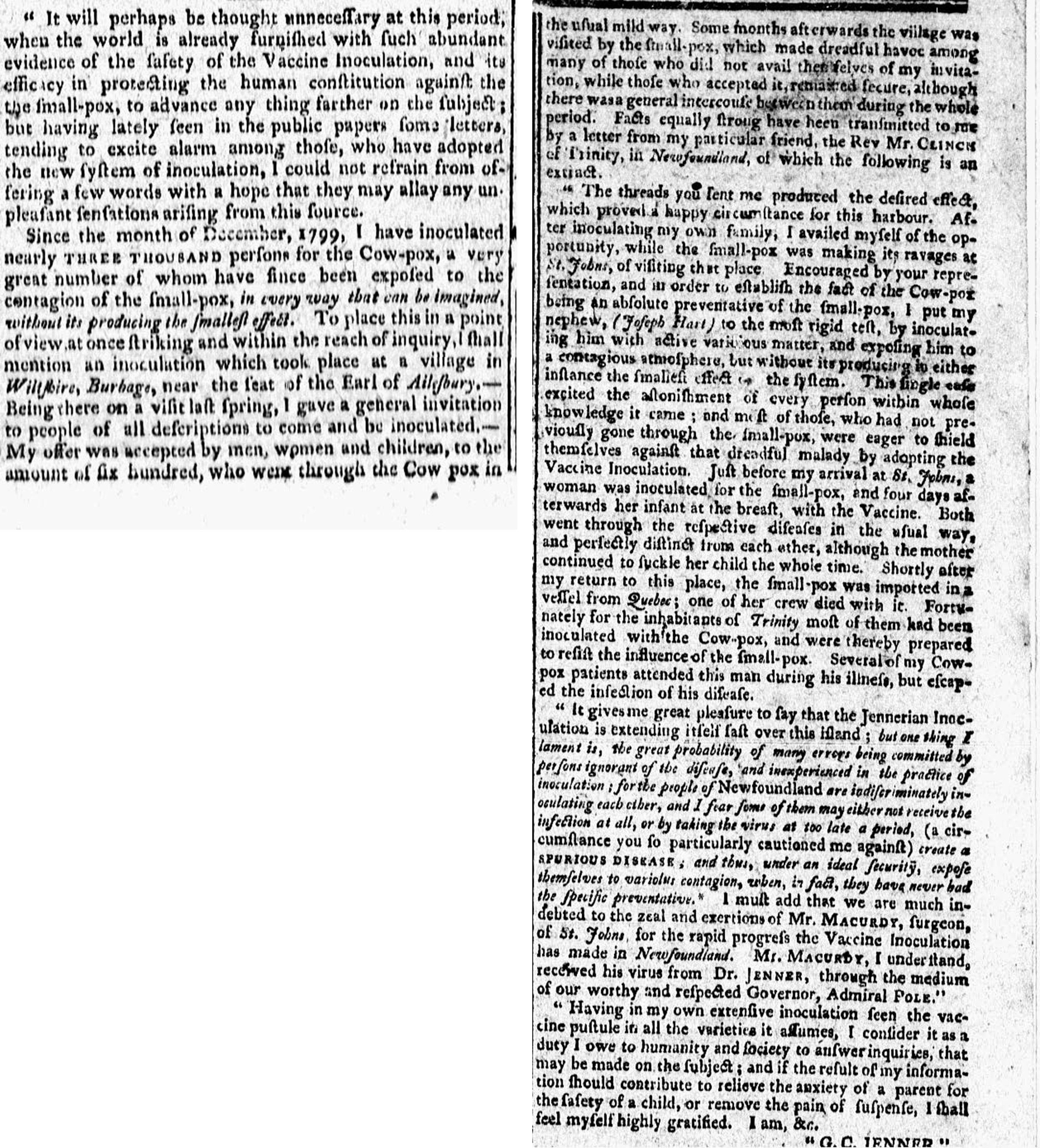
On December 16, 1801, the Philadelphia Gazette published, under the pseudonym Aurora, an article titled “Important Remarks on Vaccination” which was an extract from an account of successful research being conducted in Paris. He addresses the naysayers:
All honest minds, free from prejudice; all who will yield to evidence, believe the truth of the facts collected by the Physicians who have attended to the subject – all the opposition which it may meet with from interest or ignorance will soon vanish, and the friends of humanity may be confident of the success and adoption of a discovery essentially connected with the happiness of the people, and interest of the government… Finally, its advantages are without number, and supported by facts; and the objections to it trivial, and merely speculative.
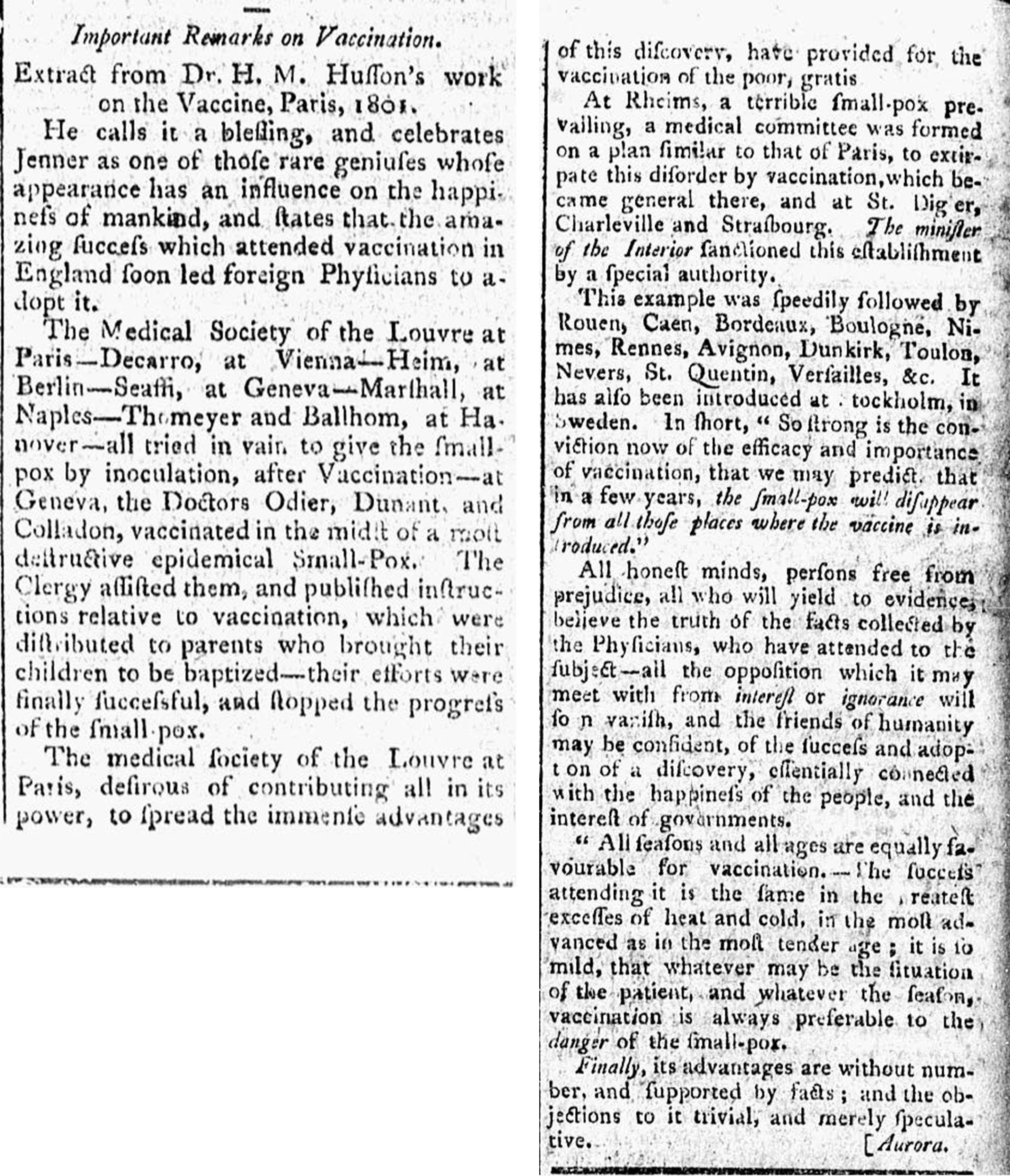
Unlike today, both the advocates for the small pox vaccination and those who opposed them were largely limited to printed material to express their views. This article from an Easton, Maryland newspaper on March 29, 1803 makes interesting remarks about one group of opposers.
The prejudices against the Vaccine system, which were at first very strong, are vanishing very fast before the vast body of evidence which has demonstrated the efficacy of this important means of lessening, if not exterminating, one of the most dreadful scourges of the human race. Even the female sex, whose dislike of the new system was so violent and so general, are so convinced of the comparative safety which attends it, to say nothing of its influence in the preservation of beauty, (a subordinate consideration no doubt with them,) that they are now among its most strenuous advocates, and are particularly zealous to promote it adoption.
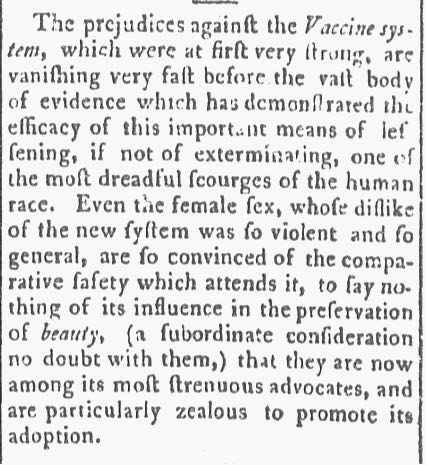
It appears that three years later the opponents of the vaccination were still voluble as reflected in an article on March 8, 1806 in The Reporter of Brattleboro, Vermont.
Notwithstanding the immense mass of evidence, of facts which has been laid before the public; and testimonial, of the Learned of all professions; both in Europe, and America, of the complete security which the Vaccine disease, affords against subsequent infection, of small pox, there are many who affect to disbelieve it. – ‘Strange infatuation!! It would seem that truth, in her native loveliness, has no charms for them; but that error, prejudice, and interest, has the complete ascendancy of such minds.’
If any can doubt, of the efficacy of Vaccinism [sic], after what has been done, to prove its virtue and reality, they must suffer under a stupid infatuation, from which nothing can arouse them, but a direful visitation of the Small pox, by which their offsprings [sic] may be swept off, a by the besom of destruction.

In spite of the rejection of vaccination in some quarters, more resources were being allocated to meet a growing demand. According to a brief article on April, 7, 1813 in the Spectator of New York City:
Dr. James Smith, of Baltimore, has been appointed by the President Agent for Vaccination, under the Act passed at the last session of Congress, authorizing the appointment of a person for preserving and distributing the genuine Vaccine matter.
![Spectator_published_as_New-York_Spectator___April_7_1813.pdf America’s Historical Newspapers, [VaccineBlog#6]](/sites/default/files/blog/VaccineBlog%235.jpg)
Two months later, Dr. Smith was at work and published an announcement in the Federal Republican of the District of Columbia on June, 2nd. This included a request:
The editors of all Newspapers within the United States, are requested to insert the above once a week for three weeks, and forward a paper containing it to the Agent for Vaccination, who will remit payment for the same by post.
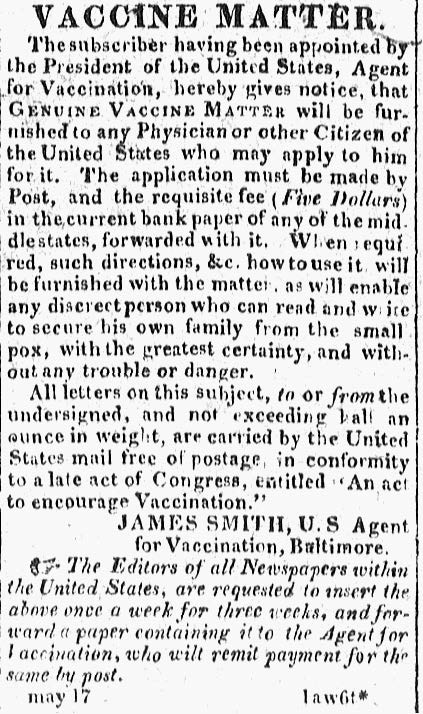
By 1818 Dr. Smith was clearly frustrated by the lack of financial support from Congress “and other legislative bodies” which led him to issue an address to the general public.
Having failed after every possible exertion to obtain from the national government, and other legislative bodies which have been tried, such pecuniary aid as would enable me to furnish the genuine Vaccine Matter, with directions how to use it, free of expense to all who might apply for it; I can find no other alternative left than a direct application to you, and upon your decision, it will be determined whether the Vaccine Institution under my direction shall be longer continued or suffered to decay.
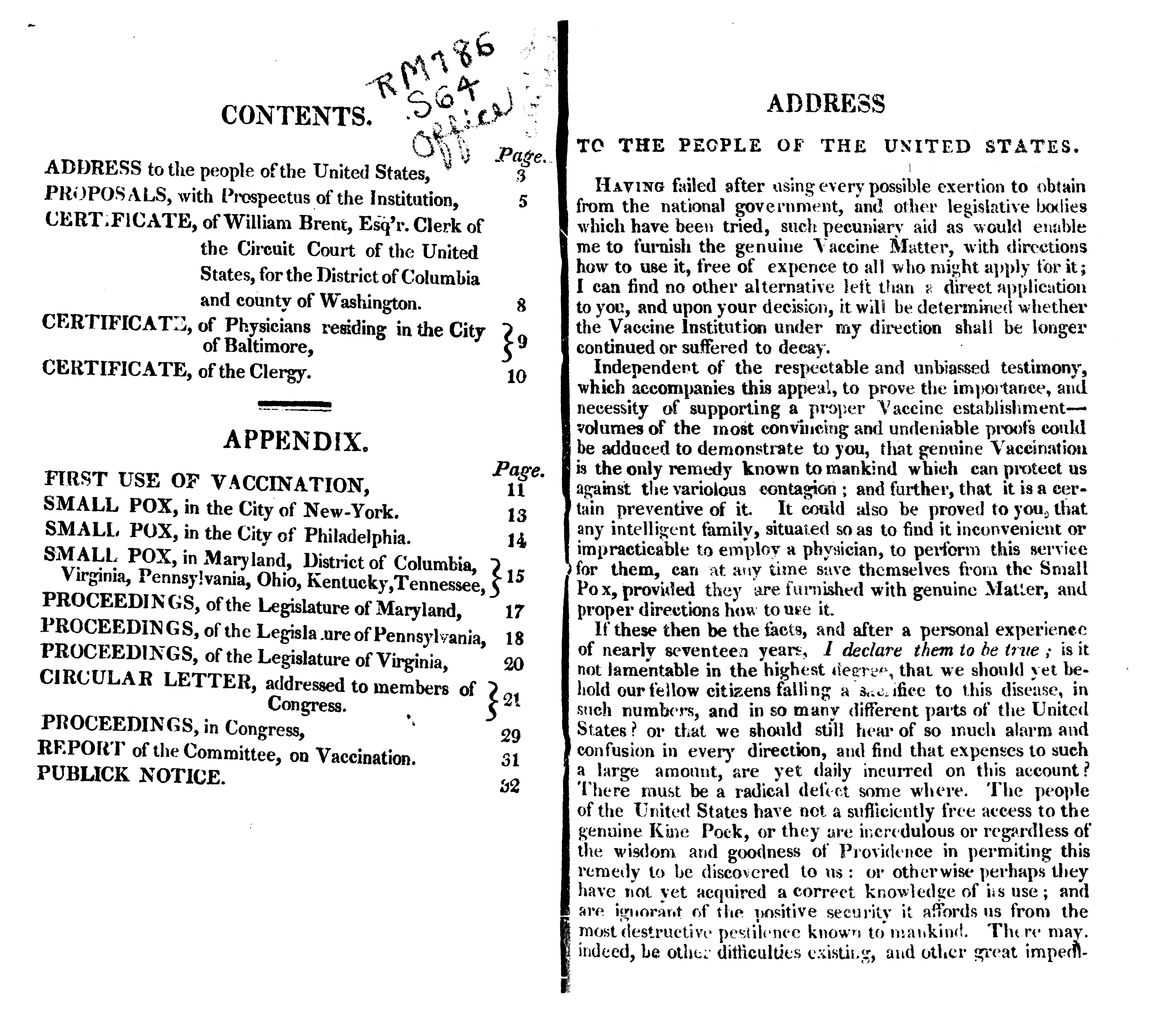
The directions Dr. Smith referred to had been printed in newspapers including the Weekly Record of Chillicothe, Ohio on July 9, 1817. They are quite specific and of interest, particularly in contrast to the process of contemporary vaccination.
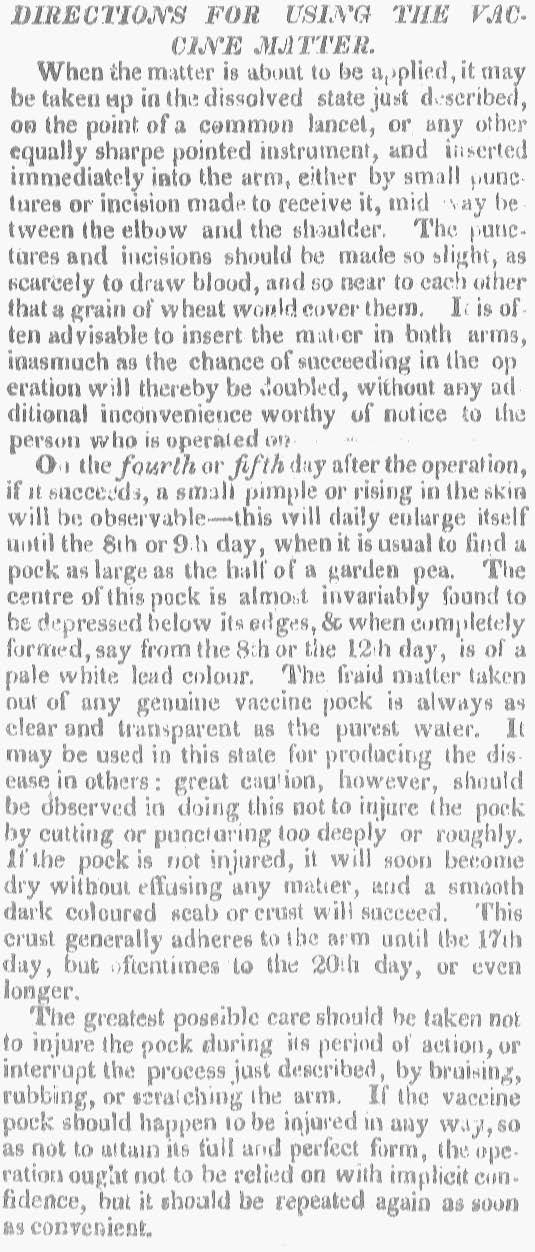
Apparently, in late 1819 a physician in North Carolina received a shipment of the “vaccine matter” which caused a negative reaction. This prompted Dr. Smith to write a letter to “the citizens of the United States” in which he seems to be forthright in accepting responsibility while taking care to address the naysayers. He states that, “neither the personal abuse or illiberal execrations that have been heaped upon me as the ostensible instrument of evil in this case, can answer any good purpose whatever.” He further asserts that “[t]o prevent the petty impositions which I have been heretofore subject to, from those who would willingly destroy this Institution, by every artifice which prejudice, ignorance, or interest, can suggest, and on account of which I have been so frequently obliged to address memorials to the national and state legislatures without receiving any proper or effectual assistance from them, I will not hereafter supply any citizen with the vaccine matter who does not first comply with the established and fair regulations of this Institution.”
![Daily_National_Intelligencer__January_28_1822.pdf, AHN, [VaccineBlog#10]](/sites/default/files/blog/VaccineBlog%2310.jpg)
The matter of the bad vaccine in North Carolina appears to have been resolved as indicated by a letter from Dr. Smith to the Speaker of the House in which he describes an error which originated in his office.
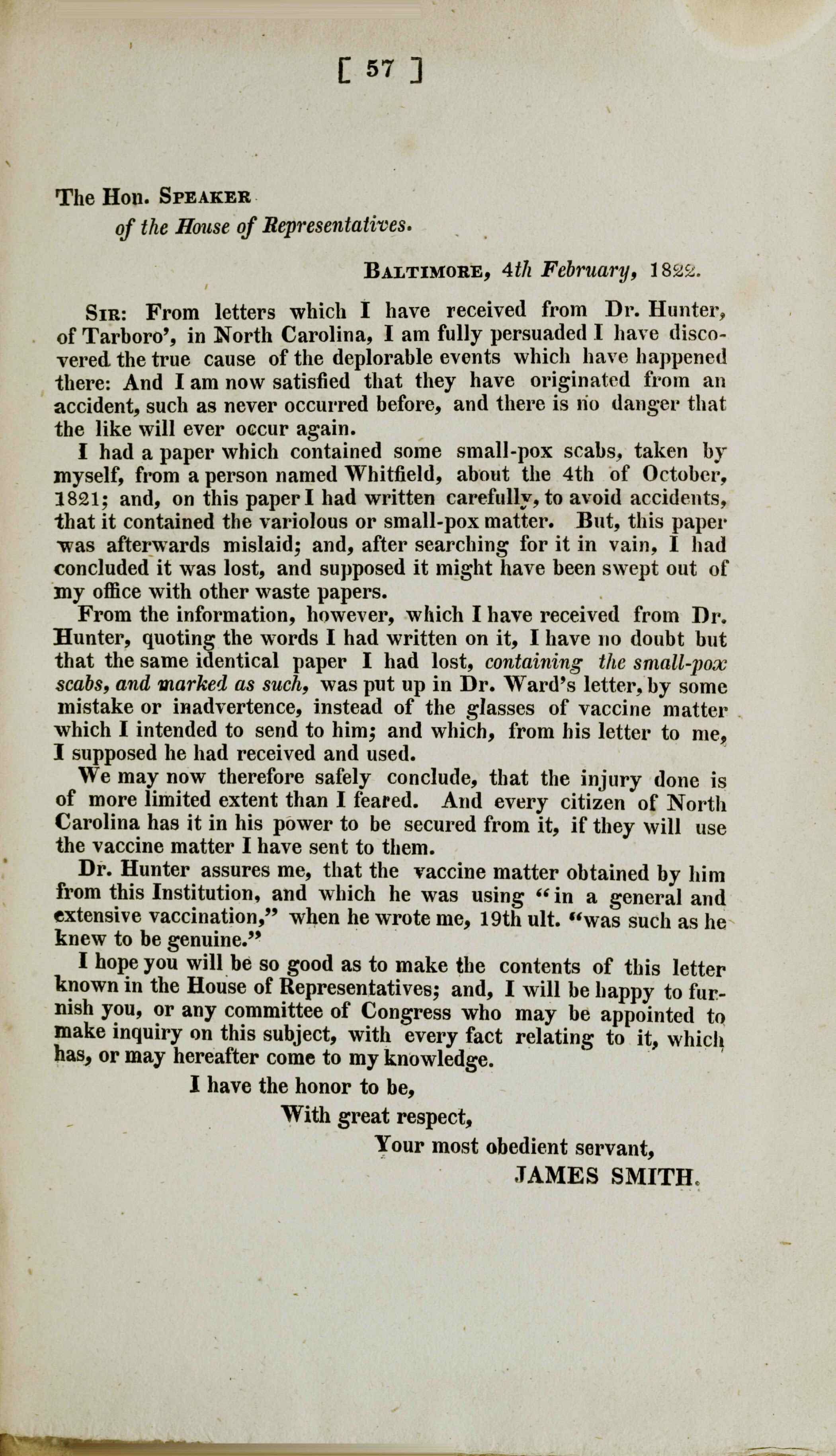
However, three months later Smith was fired by the president “in consequence, it is said, of a mistake he committed in sending small pox matter into North Carolina instead of vaccine matter, by which a number of lives were lost.”
The Fredonian of New Brunswick, New Jersey published this news in an editorial lamenting his dismissal.
The law establishing that agency, it will be seen, is likely to be pulled down, and thus the public will be left exposes to the imposition of every quack who chooses to assume the character of a physician… If Dr. Smith was an unsuitable agent, it was proper to remove him; let another be appointed in his place – but do not destroy the Institution.
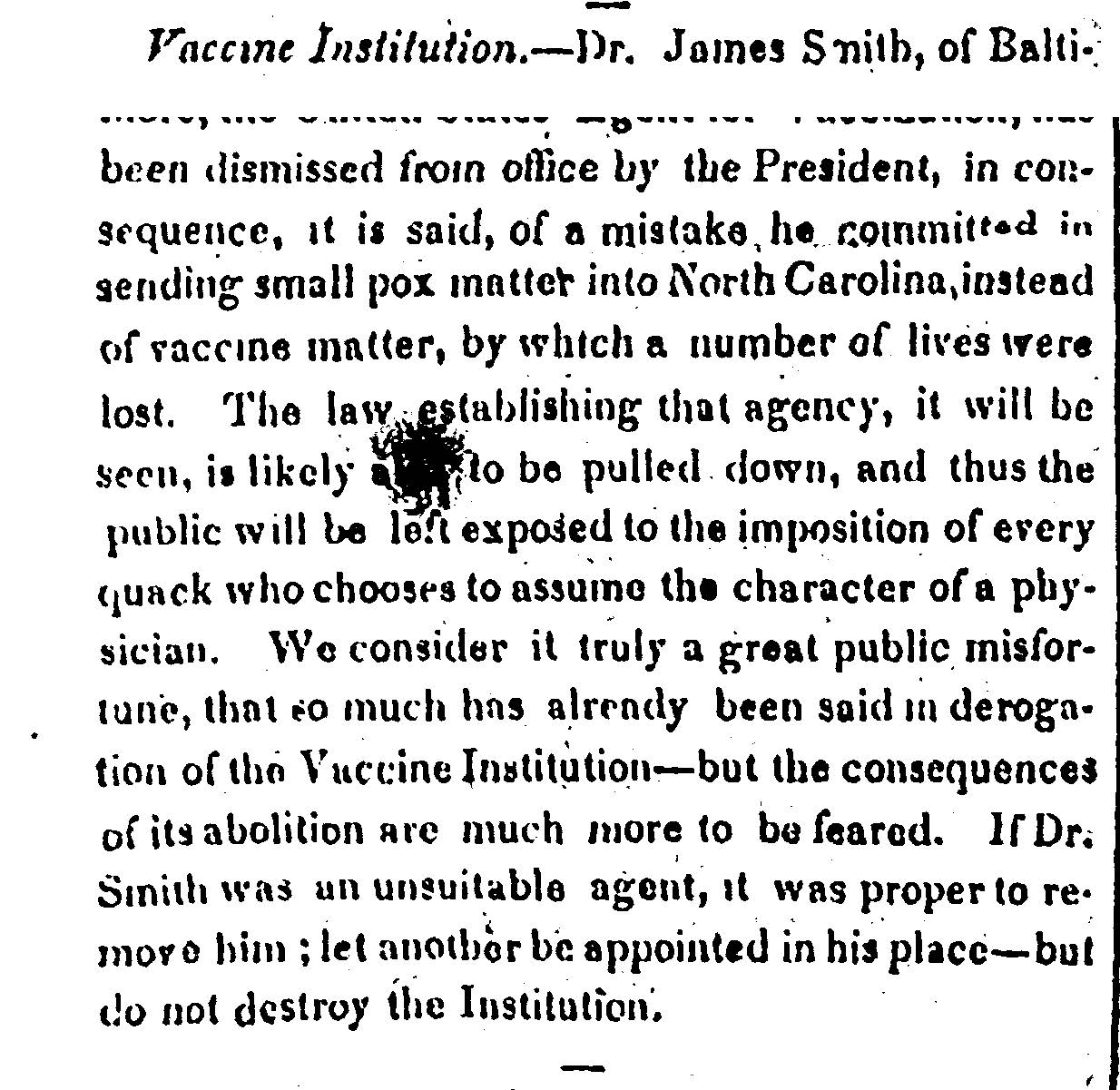
Early American Newspapers is a rich source for learning more about the quest for vaccines beyond the one for smallpox. There are many headlines seeming to promise inoculations for all manner of disease from tooth decay to the common cold. Prominent among these endeavors is an unending search for an effective vaccine against cancer. Perhaps the most broadly covered subject is polio and the ultimate triumph of science in nearly eliminating this ugly affliction. As was seen in the progress of the smallpox vaccination, each effort has been met with challenges as is true today.



